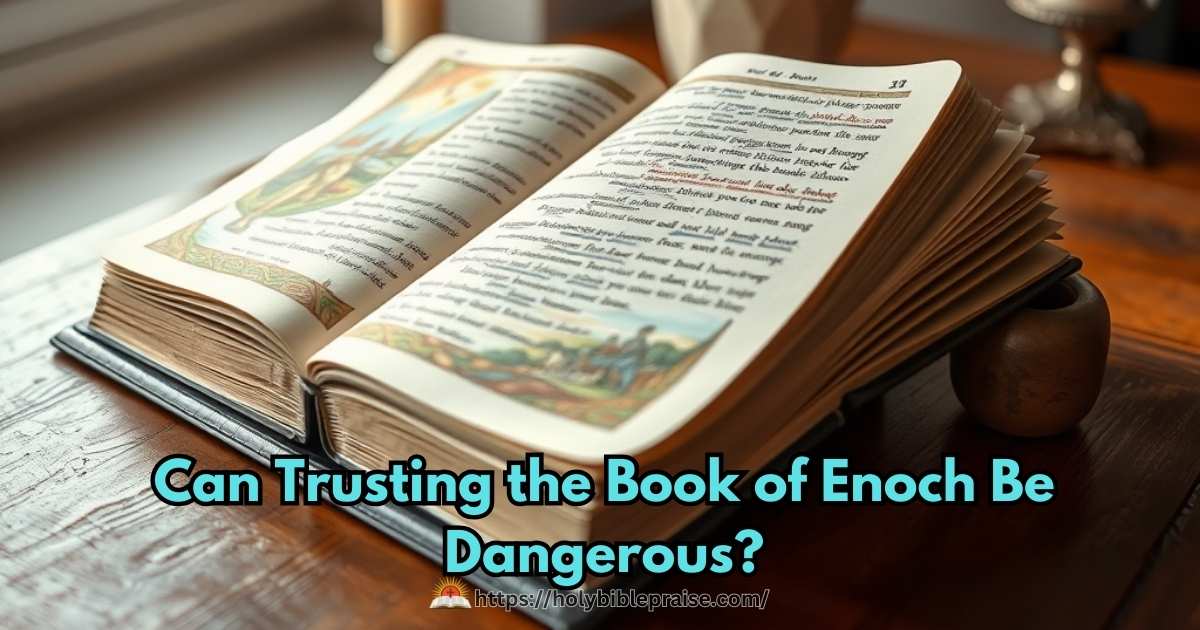Stay Alert! The Truth Is More Important Than Ever! The Book of Enoch can be intriguing, but why you must avoid the Book of Enoch is a question that every believer must think very seriously about. Although it is of historical interest, it is not included in the inspired Word of God. The Bible itself cautioned against adding and subtracting from Scripture (Revelation 22:18-19) and to remain grounded in God’s truth. During moments of uncertainty, we require the purity and wisdom available only through God’s Word.
This article is going to investigate what the Bible says about remaining loyal to God’s revealed truth and not to be deceived with misleading doctrines. Though the Book of Enoch is never quoted in the Bible, God’s Word makes it plain in the areas of discernment, false doctrine, and the Word of God as being enough. In these profound Bible verses, you will have encouragement, confidence, and an unshakeable foundation in truth that brings salvation. Let’s explore these Scriptures and deepen our faith in the unchanging Word of God!
⭐ 1. Does the Bible Command Us to Follow Only Its Books?

The Bible instructs us to read and follow only those books that are divinely inspired. This guidance is given so that we remain rooted in God’s true teachings and do not fall prey to false or incomplete doctrines.
📖 Bible Verse:
“For everything that was written in the past was written to teach us, so that through endurance and the encouragement of the Scriptures, we might have hope.” (Romans 15:4)
Explanation: This verse makes it clear that only those writings that are divinely inspired can provide us with guidance and encouragement. The Book of Enoch, which is not part of the canonized Scriptures, does not fulfill this purpose.
⭐ 2. Why Was the Book of Enoch Not Considered Part of the Bible?
Many people wonder why the Book of Enoch was not included in the Bible, despite containing spiritual insights. The reason is that only books that are God-breathed and acknowledged by Jesus Christ and His apostles are part of the Holy Scripture.
📖 Bible Verse:
“All Scripture is God-breathed and is useful for teaching, rebuking, correcting, and training in righteousness, so that the servant of God may be thoroughly equipped for every good work.” (2 Timothy 3:16-17)
Explanation: This verse confirms that only those books which God Himself inspired provide complete guidance. The early Christians rejected the Book of Enoch because it was not divinely inspired.
⭐ 3. Can Trusting the Book of Enoch Be Dangerous?

If someone believes in false teachings, it can be spiritually harmful. We must always place our trust in the true books of the Bible that God has given us.
📖 Bible Verse:
“Anyone who runs ahead and does not continue in the teaching of Christ does not have God; whoever continues in the teaching has both the Father and the Son.” (2 John 1:9)
Explanation: This verse highlights that following false teachings can lead us away from God. That is why we should always adhere to the true, divinely inspired Scriptures.
⭐ 4. How Can We Identify the Truth?
Many people accept writings like the Book of Enoch simply because they lack the knowledge to discern the truth. The Bible teaches us how to distinguish between truth and falsehood.
📖 Bible Verse:
“Then you will know the truth, and the truth will set you free.” (John 8:32)
Explanation: This verse means that knowing the truth will protect us from deception. We should only study and follow what has been truly revealed by God.
⭐ 5. How Can We Strengthen Our Faith?
To stay committed to the true teachings, we must strengthen our faith. The best way to do this is by trusting in God’s Word and applying it in our lives.
📖 Bible Verse:
“Trust in me, for I am your God who strengthens you, helps you, and upholds you with My righteous right hand.” (Isaiah 41:10)
Explanation: This verse reminds us that we should place our trust only in God and seek guidance only from His true Word.
✨ Conclusion: Trust Only in the Bible!
God has provided us with complete and preserved Scriptures that guide us on the right path. Books like the Book of Enoch are merely human writings and are not part of the true teachings. We should follow only those books that are God’s authentic Word.
📖 Call to Action: Strengthen your knowledge today by following only the Bible and applying its true teachings in your life. May God’s Word light your path!
FAQ’s
Is the Book of Enoch completely false?
The Book of Enoch is not entirely false, but it is not divinely inspired. While it may contain historical references, it lacks the authority of God’s Word and is not considered part of the Holy Bible.
2. Why do some people still read the Book of Enoch?
Some people read the Book of Enoch out of curiosity or for historical knowledge. However, it should never be treated as Scripture since it was not included in the biblical canon.
3. Did Jesus or the apostles ever quote from the Book of Enoch?
There is no evidence that Jesus or His apostles treated the Book of Enoch as divinely inspired Scripture. While Jude references a passage similar to Enoch, it does not mean the entire book was considered authoritative.
4. What should a Christian do if they have read the Book of Enoch?
If you have read the Book of Enoch, focus on the true Word of God to strengthen your faith. Reading non-biblical books should not replace or influence your understanding of God’s inspired teachings.
5. How can I ensure I follow only God’s true Word?
To stay rooted in God’s truth, study the Bible regularly, pray for discernment, and seek guidance from trusted biblical sources. Always compare any teachings with Scripture to confirm their authenticity.
>>> Want to discover more prayers? Check out our collection of prayers at holybiblepraise.com <<<

I’m Talal Mudassar, the founder of HolyBiblePraise.com, with over three years of experience in blogging about the Bible, faith, and Christian teachings. My passion is to create insightful, biblically accurate, and inspiring content that helps believers grow spiritually. Through HolyBiblePraise, I aim to make God’s Word more accessible and meaningful for everyone. Let’s grow in faith together!

